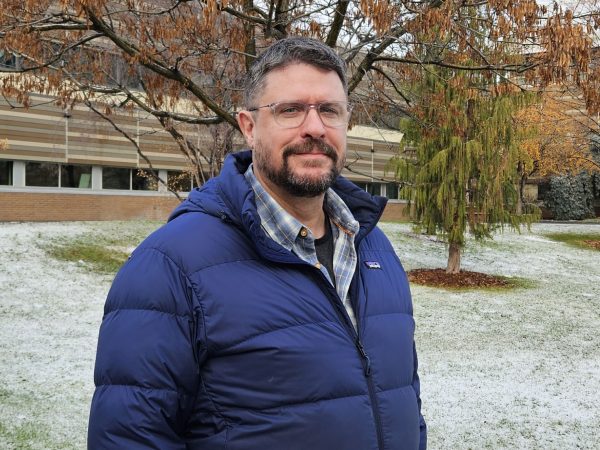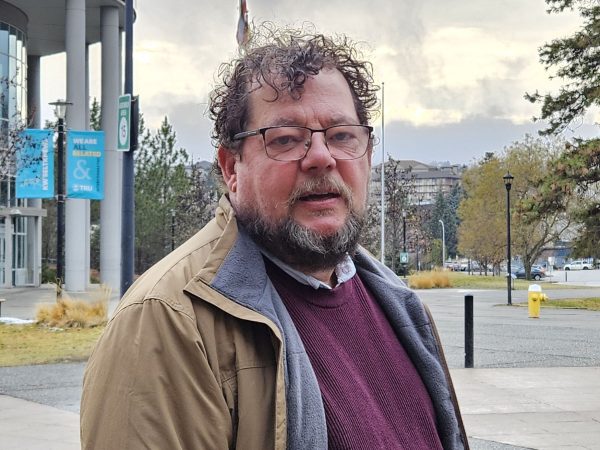By Kim Van Haren
Using nature as a teaching or learning tool isn’t new. Research has shown that a therapeutic application of nature and outdoor activities helps improve mental health, quality of life and developmental outcomes in children and youth. Seeing the benefits of using outdoor therapies as a tool, two Thompson Rivers University (TRU) faculty members have joined forces to create a class that teaches those benefits.
Need for nature

James Rodger, Faculty of Adventure, Culinary Arts and Tourism
“If you look at outdoor therapies, there’s been a long history of it through traditional outdoor programs like Outward Bound or NOLS, where they’re teaching leadership skills and healthy living skills, which we would now recognize as part of a therapeutic approach for living,” says Adventure Studies Program Co-ordinator and Assistant Teaching Professor James Rodger.
“Working in the US through the Iraq and Afghanistan wars, I saw an American program, Wounded Warrior Project, where veterans who were horrifically injured or who had post-traumatic stress disorder were placed in outdoor settings to help with the healing process. And so, outdoor therapies have been happening in a lot of different modes for years. Hundreds of years in some cases, as with the Japanese and forest bathing. In Canada, we have had adjudicated youth programs that tried something similar. We have seen a growth in understanding how beneficial the outdoors is to general health. We’re seeing such an increase in the benefits, and the science is getting done now.”
Jay Goddard, an associate teaching professor in the School of Social Work and Human Service and a therapist and counsellor, understands the wellness benefits of the outdoors. He says research into increased anxiety in youth and young adults increasingly points to the loss of unstructured play in nature as an important factor in what have become epidemic levels of youth anxiety and depression.

Jay Goddard, Faculty of Education and Social Work
“What we’ve become more aware of is just how powerful somatic and experiential changes are, just recognizing that the trauma that we carry and the things that trouble us are carried in our bodies,” he says.
“We need to find ways of addressing not just the psychological component but also the physical components. Many nature-based therapists and counsellors have really tuned in to that — recognizing and reconnecting to the land and how nature has a strong healing component. Reconnecting with where you’re meant to be, not in office environments or staring at a screen, but rather in nature.”
Supporting students
Both Rodger and Goddard are focused on creating more avenues for students who want to give back or help the community, including an outdoor therapy course offered during the 2024 summer session. While they are the leads on the project, there has been a team behind them supporting the initiative to go forward.
“From the adventure side of things, we have so much interest in it now,” says Rodger. “There’s an increased desire for alternative therapies — not just sitting in an office or lying on a couch. We’re starting to see master’s programs and the whole field of outdoor therapies really growing. It’s growing out of the work of many individual experts, including Professors Nevin Harper and Will Dobud, who are collating and facilitating conversations around the importance and the need to understand the subject.”
Rodger adds that TRU is uniquely positioned to offer a course that combines human service with adventure studies.
“No one has an adventure program like ours,” he says.
“We’d be one of the first post-secondary institutions in Canada to offer this in a really applied way or ‘pracademic’ way; practical but academic, as Jay would say. The conversation around mental health and wellness is so prevalent. Twenty per cent of our students are showing up with some sort of challenge they’re working through.”
Goddard says there’s also employability for people using the outdoors as a way to bridge communication in human services.
“We have students who really want to work outside, but we didn’t have any mechanism for teaching them that, until now,” he says. “Grads who do both are always getting employed because there’s a need.”
The summer offering, open to all students, will be the first iteration of an outdoor therapies course at TRU. Students will be required to register in both HUMS 3500 and ADVG 4240, which will provide an interdisciplinary approach for those interested in the theory and practice of nature-based therapies. The courses will be offered in a condensed format.
Rodger will be teaching the field course, including risk management, trip planning and daily activities, and Goddard will oversee theory. Students will spend a few days at Educo Adventure School, a camp in 100 Mile House that inspires people “through transformative wilderness experiences.”
Looking ahead, both instructors hope the course becomes part of a semesterized program.
“After the summer course, the goal is to run it a couple of years as a special topic, work out the kinks and then it becomes a standalone, regular course,” says Rodger.
The course allows Goddard to get back to his roots: “As a therapist and counsellor, I’ve used nature in my work. And I started off my career as a camp director. So, I’m coming full circle.”
Summer registration opens in March 2024. For more information, please contact humanservice@tru.ca.

